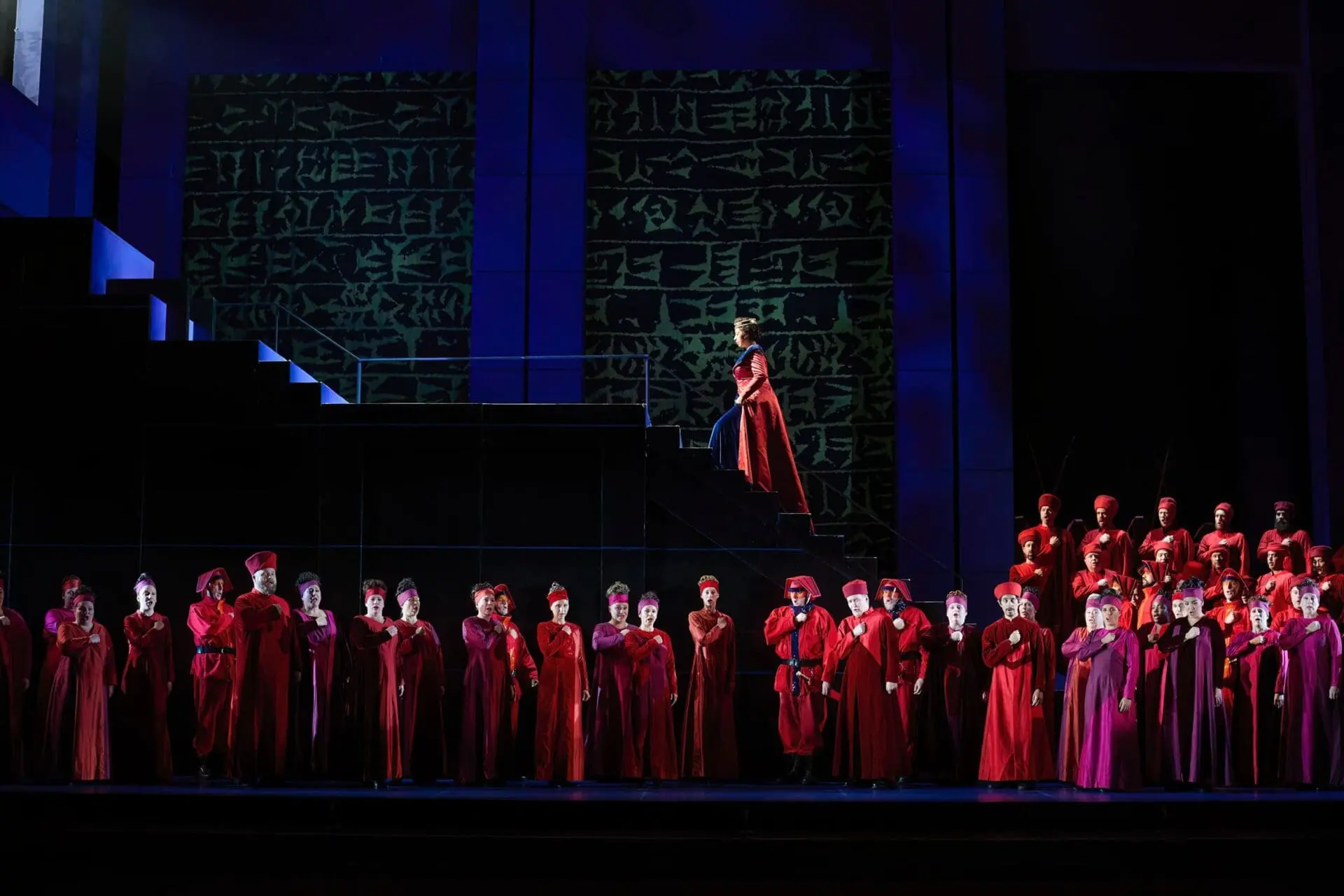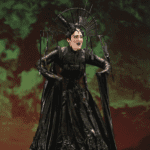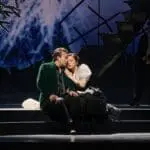The Canadian Opera Company staged Nabucco for the first time in its 74-year history, and it was a truly auspicious season opener. As I was making my way to my seat, the lobby had a noticeably festive buzz. Typical of an opening night to be sure, but I dare say many in the audience were looking forward to the opportunity of experiencing Nabucco for the first time at the COC. It’s early Verdi, with plenty of memorable bel canto tunes that leave one humming afterwards. What’s not to love?
Composed in 1841 and premiered at La Scala a year later, Nabucco was Verdi’s first major triumph. It tells the story of the ancient Israelites, conquered and enslaved in their homeland by Nabucco, the brutal Babylonian king. A grand opera in every sense, it is an epic tale of cultural and religious conflict with a love triangle thrown in for good measure. Given the current conflict between Israel and her neighbours, this work has a particular resonance. The curious coincidence of it opening at Rosh Hashanah made it even more meaningful.
A bit of preparatory research reveals some interesting statistics. Based on available performance data from the Operabase website, out of 28 operas by Verdi, Nabucco ranks fourth in popularity as measured by the number of performances, only surpassed by La traviata, Rigoletto and Aida, but beating out such warhorses as Il trovatore, Falstaff, Otello and Macbeth. It’s also the 18th most popular amongst all operas on Operabase, where they record an impressive total of 6,452 performances worldwide.
Given its popularity, this COC premiere is long overdue. The production comes from the Lyric Opera of Chicago, originally directed by Matthew Ozawa; for the COC run, Katherine Carter is the revival director. Set designer Michael Yeargan has created a visually imposing set, replete with outsized columns, steps, and projections of ancient Hebrew text. It made a powerful impression, perhaps not so much of beauty, but it had strong theatrical impact.
Musically it was equally epic. It is great to welcome back Italian maestro Paolo Carignani, who has previously conducted Carmen, La bohème and Tosca at the COC. A veteran Verdi specialist, Carignani led the COC forces with a sure hand in a performance of marvelous rhythmic precision, agility and nuance, high in decibels but never resorting to bombast. Talk about fire and brimstone! I joked to my opera companion that the torrent of sound from the pit was enough to strike fear of God in the hearts of the unbelievers in the audience.
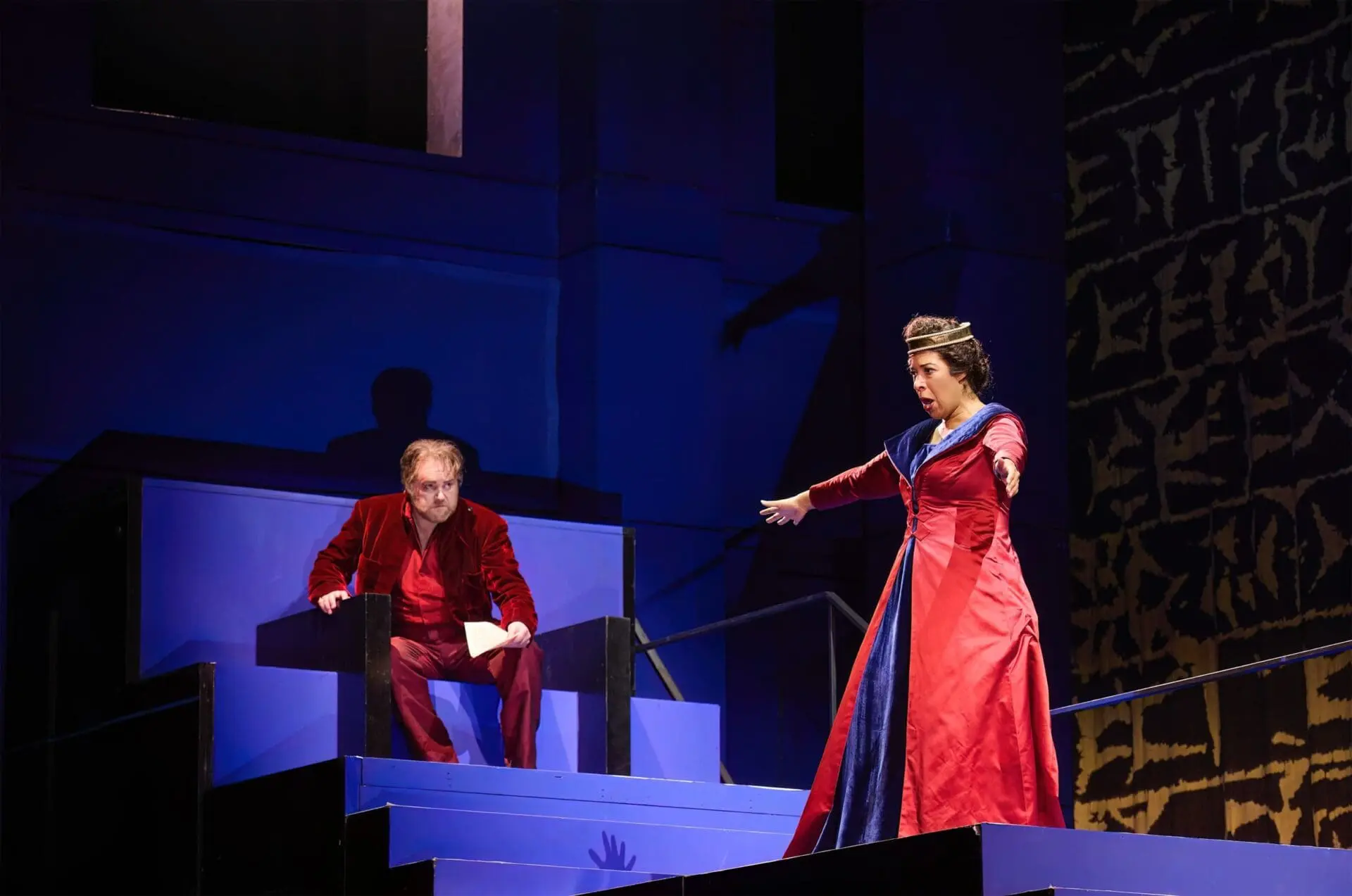
Photo Credit: Michael Cooper
Roland Wood (Nabucco) and Mary Elizabeth Williams (Abigaille) in the COC’s Nabucco
Verdi’s choral writing is front and centre in Nabucco, and the COC has done it full justice by augmenting the chorus to an impressive 56 members. “Va, pensiero,” the Chorus of the Hebrew Slaves, is undoubtedly one of the most famous and beloved tunes in Italian opera. This five-minute piece was affectingly staged and touchingly performed by the COC Chorus. The audience showed its approval with generous and well-deserved applause.
I have saved my comments on the principals for last, because they were the most outstanding aspect of the premiere. American soprano Mary Elizabeth Williams was an exceptional Abigaille, a taxing role that few dramatic sopranos can do full justice. I heard Williams at the Santa Fe Opera last year as the Foreign Princess in Rusalka, a brief 10-minute role that didn’t prepare me for her Abigaille.
Williams’ instrument is capable of a honeyed mezza voce as well as an impressive forte, very good coloratura, and plenty of chiaroscuro for maximum dramatic effect. Her spinto soprano, while not particularly large, is beautifully focused, allowing it to be heard over the orchestra. Her big moment in Act Two, “Ben io t’invenni… Anch’io dischiuso” was impressive, with sufficient chest voice in the two-octaves descent. She also has the dramatic instinct to bring the character to life. Let’s hope the COC will bring Williams back in a future season.
With such a notable Abigaille, Nabucco could be playing second fiddle, but Scottish baritone and COC audience favourite Roland Wood was up to the challenge. He did take a bit of time to warm up, but after that he was wonderful, hitting his stride with a most heartfelt “Dio di Giuda.” Korean bass Simon Lim made his company debut as a fine Zaccaria. He’s more a basso cantante than a basso profundo, but a pleasure to the ear just the same.
The rest of the very fine cast was taken by Canadians, mostly present and former members of the COC Ensemble Studio. Mezzo Rihab Chaieb was a vocally and dramatically sympathetic Fenena. Her voice has grown in volume and beauty, and she is deserving of a major career. Equally fine was tenor Matthew Cairns (Ismaele), whose budding dramatic tenor is destined to go places. Bass Duncan Stenhouse, the newest member of the Ensemble Studio, made a strong impression as the High Priest of Baal.
There you have it, a great start to the 2024-25 season, and a wonderful way to spend an evening at the opera.
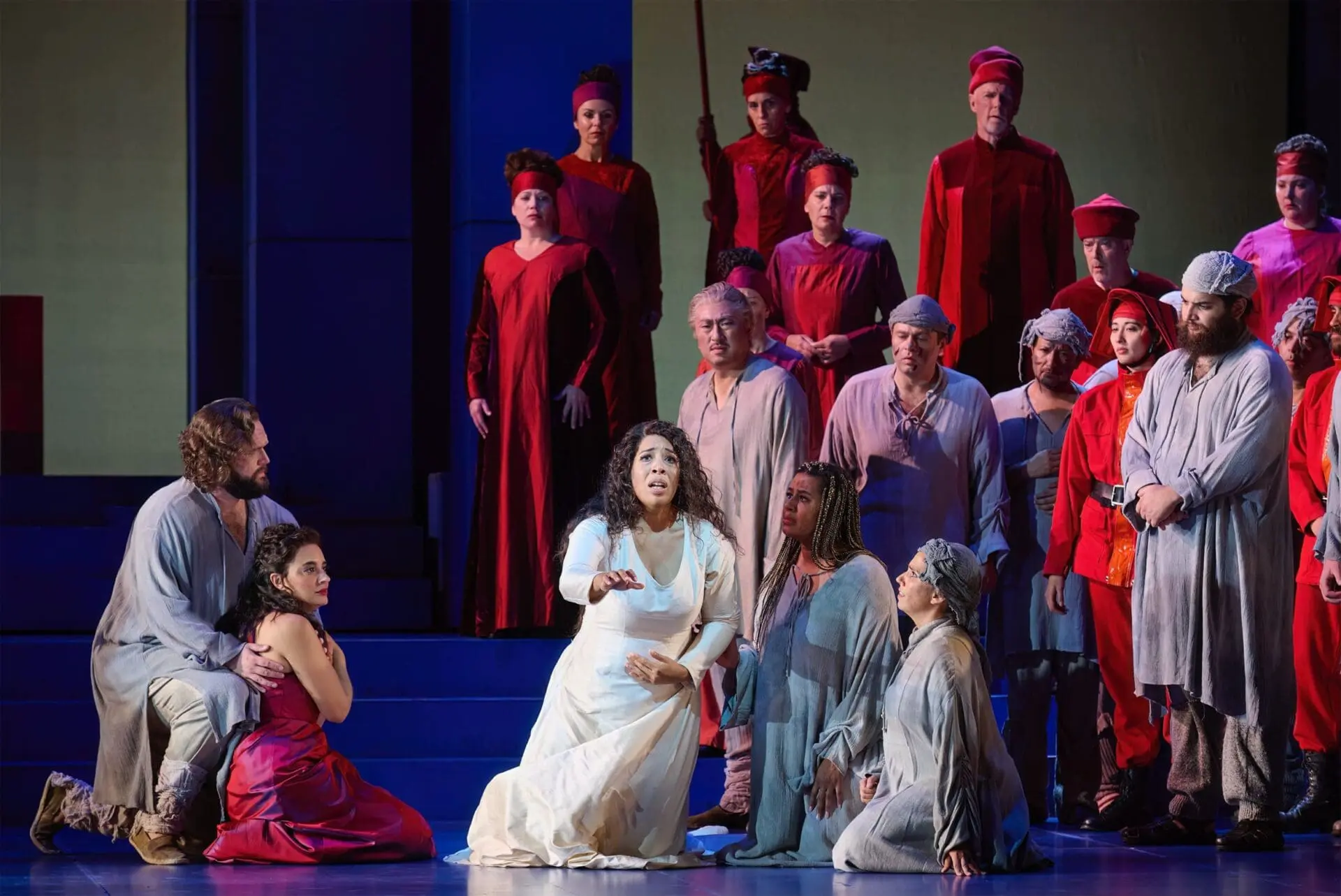
Photo Credit: Michael Cooper
Matthew Cairns, Rihab Chaieb and Mary Elizabeth Williams (foreground, left to right) in Nabucco
Opera Canada depends on the generous contributions of its supporters to bring readers outstanding, in-depth coverage of opera in Canada and beyond. Please consider subscribing or donating today.


